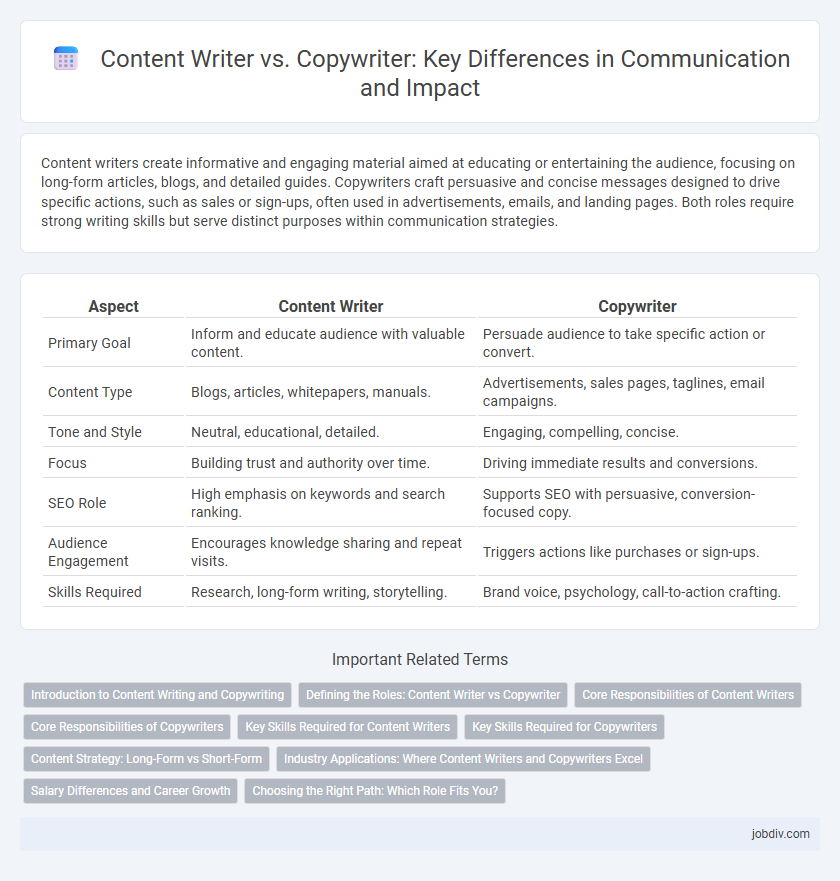Content writers create informative and engaging material aimed at educating or entertaining the audience, focusing on long-form articles, blogs, and detailed guides. Copywriters craft persuasive and concise messages designed to drive specific actions, such as sales or sign-ups, often used in advertisements, emails, and landing pages. Both roles require strong writing skills but serve distinct purposes within communication strategies.
Table of Comparison
| Aspect | Content Writer | Copywriter |
|---|---|---|
| Primary Goal | Inform and educate audience with valuable content. | Persuade audience to take specific action or convert. |
| Content Type | Blogs, articles, whitepapers, manuals. | Advertisements, sales pages, taglines, email campaigns. |
| Tone and Style | Neutral, educational, detailed. | Engaging, compelling, concise. |
| Focus | Building trust and authority over time. | Driving immediate results and conversions. |
| SEO Role | High emphasis on keywords and search ranking. | Supports SEO with persuasive, conversion-focused copy. |
| Audience Engagement | Encourages knowledge sharing and repeat visits. | Triggers actions like purchases or sign-ups. |
| Skills Required | Research, long-form writing, storytelling. | Brand voice, psychology, call-to-action crafting. |
Introduction to Content Writing and Copywriting
Content writing involves creating informative and engaging text aimed at educating or entertaining a target audience, often used in blogs, articles, and websites to build trust and authority. Copywriting focuses on persuasive language designed to drive specific actions, such as sales, subscriptions, or brand awareness through advertisements, landing pages, and marketing campaigns. Both disciplines require strong writing skills but differ in their purpose, tone, and strategic approach within digital marketing.
Defining the Roles: Content Writer vs Copywriter
Content writers focus on creating informative, engaging, and value-driven articles, blog posts, and web content aimed at educating or entertaining readers. Copywriters specialize in crafting persuasive, concise text designed to drive actions such as purchases, sign-ups, or clicks in marketing materials like ads, sales pages, and email campaigns. The primary distinction lies in content writers prioritizing information delivery and SEO, while copywriters emphasize conversion and brand messaging impact.
Core Responsibilities of Content Writers
Content writers specialize in creating informative, engaging, and well-researched articles, blog posts, and website content that enhance brand authority and support SEO strategies. Their core responsibilities include developing original content tailored to target audiences, optimizing text for search engines using relevant keywords, and maintaining consistent messaging aligned with the brand's voice. Content writers prioritize delivering value through clarity and depth, ensuring the audience gains useful insights rather than solely driving sales conversions.
Core Responsibilities of Copywriters
Copywriters craft persuasive and compelling content aimed at driving specific actions, such as sales or lead generation, by focusing on audience engagement and brand messaging. Their core responsibilities include creating advertising materials, promotional emails, product descriptions, and call-to-action statements that resonate with target audiences. Copywriters also collaborate with marketing teams to ensure consistency in tone, style, and strategic objectives across all communication channels.
Key Skills Required for Content Writers
Content writers excel in research, storytelling, and SEO optimization, enabling them to create informative and engaging articles, blogs, and web pages that attract and retain readers. Mastery of grammar, adaptability to various tones, and keyword integration are essential skills for content writers to enhance online visibility and audience engagement. Strong analytical skills and proficiency with content management systems further empower content writers to deliver well-structured and targeted content aligned with the brand's communication strategy.
Key Skills Required for Copywriters
Copywriters require strong persuasive writing skills to craft compelling messages that drive customer action and brand engagement. Mastery of SEO techniques and keyword research enhances copy visibility and effectiveness in digital marketing campaigns. Proficiency in adapting tone and style to diverse audiences ensures clear communication and maximized conversion rates.
Content Strategy: Long-Form vs Short-Form
Content writers specialize in long-form content that enhances SEO through comprehensive articles, blog posts, and whitepapers designed to engage readers and provide in-depth information. Copywriters focus on short-form content, crafting compelling headlines, advertisements, and social media posts aimed at driving immediate conversions and brand awareness. Effective content strategy balances both long-form and short-form formats to optimize audience engagement and achieve marketing objectives.
Industry Applications: Where Content Writers and Copywriters Excel
Content writers excel in industries requiring in-depth information and education, such as technology, healthcare, and finance, by producing detailed articles, whitepapers, and blogs that build brand authority. Copywriters thrive in advertising, e-commerce, and marketing sectors, crafting persuasive messages and calls-to-action that drive sales and customer engagement. Both roles are essential in digital marketing ecosystems, where content writers support SEO and knowledge sharing while copywriters enhance conversion rates and brand messaging.
Salary Differences and Career Growth
Content writers typically earn an average salary ranging from $45,000 to $65,000 annually, while copywriters often command higher salaries between $55,000 and $75,000 due to the direct impact of their work on sales and marketing. Career growth for copywriters generally offers faster advancement opportunities into specialized roles like creative director or brand strategist, whereas content writers may transition into editorial or content marketing management positions over time. Salary differences reflect demand in digital marketing sectors where persuasive copywriting skills drive higher revenue generation compared to informational content creation.
Choosing the Right Path: Which Role Fits You?
Content writers excel in creating informative, engaging articles and blog posts that educate and build trust with the audience, making them ideal for brands focused on long-term relationship building. Copywriters specialize in persuasive, concise messaging designed to drive immediate action, such as sales or sign-ups, suited for marketing campaigns and advertising. Assessing your strengths in storytelling versus persuasion helps determine whether content writing or copywriting aligns best with your career goals in communication.
Content Writer vs Copywriter Infographic

 jobdiv.com
jobdiv.com